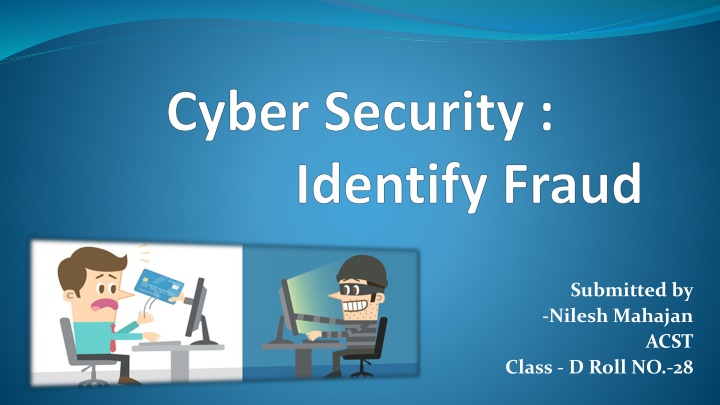
Preventing Online Fraud: Types, Detection, and Protection Tips
Learn about the various types of online fraud, how to detect security compromises, and essential protection measures such as antivirus software, firewalls, and safeguarding personal data to prevent becoming a victim of online scams and cybercrimes.
Download Presentation

Please find below an Image/Link to download the presentation.
The content on the website is provided AS IS for your information and personal use only. It may not be sold, licensed, or shared on other websites without obtaining consent from the author. If you encounter any issues during the download, it is possible that the publisher has removed the file from their server.
You are allowed to download the files provided on this website for personal or commercial use, subject to the condition that they are used lawfully. All files are the property of their respective owners.
The content on the website is provided AS IS for your information and personal use only. It may not be sold, licensed, or shared on other websites without obtaining consent from the author.
E N D
Presentation Transcript
Submitted by -Nilesh Mahajan ACST Class - D Roll NO.-28
Online Fraud Online fraud and scams operate under many different disguises and go by many names, including consumer cybercrime, internet fraud, online crime, and e-crime. No matter what it s called, it causes considerable distress to everyone it affects, and it can even culminate in serious financial problems, as some victims have discovered. Using false pretenses. Pretending to be someone or something you re not. Creating a counterfeit item or service.
Types Of Online Fraud Phishing 419 Scam ( Nigerian Scam ) Identity Theft Debit & Credit Card Fraud Online Shopping Fraud Social Media Fraud Government Documents Fraud Check Fraud Overpayment Scam Pump-and-Dump
Identifying Security Compromises Antivirus software detects a problem. Disk space disappears unexpectedly. Pop-ups suddenly appear, sometimes selling security software. Files or transactions appear that should not be there. The computer slows down to a crawl. Unusual messages, sounds, or displays on your monitor. Stolen laptop: 1 stolen every 53 seconds; 97% never recovered. The mouse pointer moves by itself. The computer spontaneously shuts down or reboots. Often unrecognized or ignored problems.
Anti-virus and Anti-spyware Software Antivirus software detects certain types of malware and can destroy it before any damage is done. Install and maintain antivirus and antispyware software. Be sure to keep antivirus software updated. Many free and commercial options exist. Contact your Technology Support Professional for assistance.
Host-based Firewalls A firewall acts as a barrier between your computer/private network and the internet. Hackers may use the internet to find, use, and install applications on your computer. A firewall prevents many hacker connections to your computer. Firewalls filter network packets that enter or leave your computer.
Dos And Dont To Avoid Fraud Protect your personal data. Keep your passwords secure and change them regularly. Check your credit report at least annually, if not every 4 months. Take immediate action if you think your personal information has been compromised. Be aware of onlookers when using your credit/debit card and entering your PIN number. Shred personal documents do not just toss them in the trash. Password protect all documents your send over the internet. Monitor your financial accounts for suspicious activity on a regular basis this includes bank accounts, credit cards and investments. 1. 2. 3. 4. 5. 6. 7. 8.
Provide personal information over the phone or internet unless you initiate the contact Don t talk to a stranger. Toss documents with your personal information in the trash, this includes offers to open a new credit card account. Share your personal data or leave it unprotected. Access online banking from shared or public computers. Click on attachments and links without knowing their true origin. 1. 2. 3. 4. 5.






















